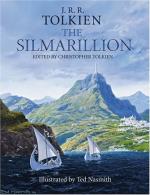|
This section contains 554 words (approx. 2 pages at 300 words per page) |

|
I feel that Tolkien did not revise and add to [The Silmarillion] over the years as an escape, though it does seem in one way to belong to a deep, almost childlike need to fix and possess for ever a part of the English countryside (and in this sense it could be said to bear the same relation to his practical life as "The Wind in the Willows" bore to Kenneth Grahame's.) The clue to reading it can be found, perhaps, in Leaf by Niggle. The Silmarillion is the creation of what Tolkien called a Secondary World, just as much as Lord of the Rings though in a different style. It is a piece of literary invention which depends on semantics rather than on social morality. It is true that the whole work reflects the rise of aggression in gods, elves and men, the effects of greed and...
|
This section contains 554 words (approx. 2 pages at 300 words per page) |

|


